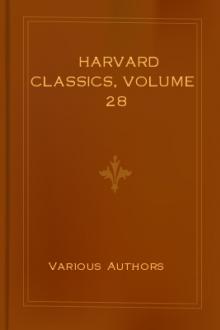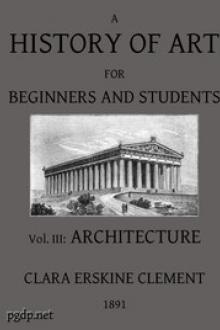Chronicle and Romance, - [ready to read books .TXT] 📗

- Author: -
- Performer: -
Book online «Chronicle and Romance, - [ready to read books .TXT] 📗». Author -
Dogs of the homely kind are either shepherd's curs or mastiffs. The first are so common that it needeth me not to speak of them. Their use also is so well known in keeping the herd together (either when they grass or go before the shepherd) that it should be but in vain to spend any time about them. Wherefore I will leave this cur unto his own kind, and go in hand with the mastiff, tie dog, or band dog, so called because many of them are tied up in chains and strong bonds in the daytime, for doing hurt abroad, which is a huge dog, stubborn, ugly, eager, burthenous of body (and therefore of but little swiftness), terrible and fearful to behold, and oftentimes more fierce and fell than any Archadian or Corsican cur. Our Englishmen, to the extent that these dogs may be more cruel and fierce, assist nature with some art, use, and custom. For although this kind of dog be capable of courage, violent, valiant, stout, and bold: yet will they increase these their stomachs by teaching them to bait the bear, the bull, the lion, and other such like cruel and bloody beasts (either brought over or kept up at home for the same purpose), without any collar to defend their throats, and oftentimes there too they train them up in fighting and wrestling with a man (having for the safeguard of his life either a pikestaff, club, sword, privy coat), whereby they become the more fierce and cruel unto strangers. The Caspians make so much account sometimes of such great dogs that every able man would nourish sundry of them in his house of set purpose, to the end they should devour their carcases after their deaths thinking the dog's bellies to be the most honourable sepulchres. The common people also followed the same rate, and therefore there were tie dogs kept up by public ordinance, to devour them after their deaths: by means whereof these beasts became the more eager, and with great difficulty after a while restrained from falling upon the living. But whither am I digressed? In returning therefore to our own, I say that of mastiffs, some bark only with fierce and open mouth but will not bite; but the cruelest do either not bark at all or bite before they bark, and therefore are more to be feared than any of the other. They take also their name of the word "mase" and "thief" (or "master-thief" if you will), because they often stound and put such persons to their shifts in towns and villages, and are the principal causes of their apprehension and taking. The force which is in them surmounteth all belief, and the fast hold which they take with their teeth exceedeth all credit: for three of them against a bear, four against a lion, are sufficient to try mastries with them. King Henry the Seventh, as the report goeth, commanded all such curs to be hanged, because they durst presume to fight against the lion, who is their king and sovereign. The like he did with an excellent falcon, as some say, because he feared not hand-to-hand match with an eagle, willing his falconers in his own presence to pluck off his head after he was taken down, saying that it was not meet for any subject to offer such wrong unto his lord and superior, wherein he had a further meaning. But if King Henry the Seventh had lived in our time what would he have done to our English mastiff, which alone and without any help at all pulled down first a huge bear, then a pard, and last of all a lion, each after other before the French king in one day, when the Lord Buckhurst was ambassador unto him, and whereof if I should write the circumstances, that is, how he took his advantage being let loose unto them, and finally drave them into such exceeding fear, that they were all glad to run away when he was taken from them, I should take much pains, and yet reap but small credit: wherefore it shall suffice to have said thus much thereof. Some of our mastiffs will rage only in the night, some are to be tied up both day and night. Such also as are suffered to go loose about the house and yard are so gentle in the daytime that children may ride on their backs and play with them at their pleasures. Divers of them likewise are of such jealousy over their master and whosoever of his household, that if a stranger do embrace or touch any of them, they will fall fiercely upon them, unto their extreme mischief if their fury be not prevented. Such a one was the dog of Nichomedes, king sometime of Bithynia, who seeing Consigne the queen to embrace and kiss her husband as they walked together in a garden, did tear her all to pieces, maugre his resistance and the present aid of such as attended on them. Some of them moreover will suffer a stranger to come in and walk about the house or yard where he listeth, without giving over to follow him: but if he put forth his hand to touch anything, then will they fly upon them and kill them if they may. I had one myself once, which would not suffer any man to bring in his weapon further than my gate: neither those that were of my house to be touched in his presence. Or if I had beaten any of my children, he would gently have essayed to catch the rod in his teeth and take it out of my hand or else pluck down their clothes to save them from the stripes: which in my opinion is not unworthy to be noted.
The last sort of dogs consisteth of the currish kind meet for many toys, of which the whappet or prick-eared cur is one. Some men call them warners, because they are good for nothing else but to bark and give warning when anybody doth stir or lie in wait about the house in the night season. Certes it is impossible to describe these curs in any order, because they have no one kind proper unto themselves, but are a confused company mixed of all the rest. The second sort of them are called turnspits, whose office is not unknown to any. And as these are only reserved for this purpose, so in many places our mastiffs (beside the use which tinkers have of them in carrying their heavy budgets) are made to draw water in great wheels out of deep wells, going much like unto those which are framed for our turnspits, as is to be seen at Roiston, where this feat is often practised. Besides these also we have sholts or curs daily brought out of Ireland, and made much of among us, because of their sauciness and quarrelling. Moreover they bite very sore, and love candles exceedingly, as do the men and women of their country; but I may say no more of them, because they are not bred with us. Yet this will I make report of by the way, for pastime's sake, that when a great man of those parts came of late into one of our ships which went thither for fish, to see the form and fashion of the same, his wife apparelled in fine sables, abiding on the deck whilst her husband was under the hatches with the mariners, espied a pound or two of candles hanging on the mast, and being loath to stand there idle alone, she fell to and eat them up every one, supposing herself to have been at a jolly banquet, and shewing very pleasant gesture when her husband came up again unto her.
The last kind of toyish curs are named dancers, and those being of a mongrel sort also, are taught and exercised to dance in measure at the musical sound of an instrument, as at the just stroke of a drum, sweet accent of the citharne, and pleasant harmony of the harp, shewing many tricks by the gesture of their bodies: as to stand bolt upright, to lie flat on the ground, to turn round as a ring holding their tails in their teeth, to saw and beg for meat, to take a man's cap from his head, and sundry such properties, which they learn of their idle roguish masters, whose instruments they are to gather gain, as old apes clothed in motley and coloured short-waisted jackets are for the like vagabonds, who seek no better living than that which they may get by fond pastime and idleness. I might here intreat of other dogs, as of those which are bred between a bitch and a wolf, also between a bitch and a fox, or a bear and a mastiff. But as we utterly want the first sort, except they be brought unto us: so it happeneth sometimes that the other two are engendered and seen at home amongst us. But all the rest heretofore remembered in this chapter there is none more ugly and odious in sight, cruel and fierce in deed, nor untractable in hand, than that which is begotten between the bear and the bandog. For whatsoever he catcheth hold of he taketh it so fast that a man may sooner tear and rend his body in sunder than get open his mouth to separate his chaps. Certes he regardeth neither wolf, bear, nor lion, and therefore may well be compared with those two dogs which were sent to Alexander out of India (and procreated as it is thought between a mastiff and a male tiger, as be those also of Hircania), or to them that are bred in Archadia, where copulation is oft seen between lions and bitches, as the lion is in France (as I said) between she wolves





Comments (0)